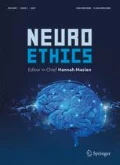Abstract
At least since 2003, when the US President’s Council on Bioethics published Beyond Therapy: Biotechnology and the Pursuit of Happiness, there has been heated debate about the ethics of using pharmacology to reduce the intensity of emotions associated with painful memories. That debate has sometimes been conducted in language that obfuscates as much as it illuminates. I argue that the two sides of the debate actually agree that, in general, it is good to reduce the emotional intensity of memories associated with traumatic events, when (as in the case of Post Traumatic Stress Disorder) the intensity of those memories is disproportionate to the precipitating traumatic event. Both sides also agree that, in general—not as an ironclad rule—it is bad to reduce the emotional intensity of memories associated with difficult but normal human problems of living, when the intensity of the emotions is proportionate to those problems. Between those two areas of agreement, there is a zone of ambiguity, in which reasonable people, who proceed from different but equally ethical frameworks, may indeed reach different conclusions about the same set of facts. But I will argue that even in the zone of ambiguity, there is more agreement than the language favored by the different frameworks sometimes suggests. Ultimately, I suggest that if we see the extent to which the substantive differences between the two frameworks are smaller than their articulators’ language sometimes suggests, we can engage in a more productive conversation about whether a particular intervention will facilitate or diminish human flourishing.
Similar content being viewed by others
References
President’s Council on Bioethics. 2003. Beyond therapy: Biotechnology and the pursuit of happiness. New York: New York, Regan Books.
Henry, Michael, Jennifer R. Fishman, and Stuart J. Youngner. 2007. Propranolol and the prevention of post-traumatic stress disorder: is it wrong to erase the “sting” of bad memories? American Journal of Bioethics 7(9): 12–20.
Levy, Neil. 2007. Neuroethics: Challenges for the 21st century, 171–72. New York: Cambridge University Press.
Wasserman, David. 2004. Making memory lose its sting. Philosophy & Public Policy Quarterly 24(4): 12–18. at 13.
Conrad, Peter. 2007. The medicalization of society: On the transformation of human conditions into treatable disorders. Baltimore: Johns Hopkins University Press.
Parens, E. 2006. Surgically shaping children: Technology, ethics, and the pursuit of normality. Baltimore: Johns Hopkins University Press.
Linley, Alex, and Stephen Joseph. 2004. Positive change following trauma and adversity: a review. Journal of Traumatic Stress 17(1): 11–21.
Tedeschi, Richard, and Lawrence Calhoun. 2004. Posttraumatic growth: conceptual foundations and empirical evidence. Psychological Inquiry 15(1): 1–18.
North, C., A. Suris, M. Davis, and R.P. Smith. 2008. Toward validation of the diagnosis of posttraumatic stress disorder. American Journal of Psychiatry AiA: 1–8.
Aikens, Deane. The use of pharmacology to augment psychotherapy gains. Forthcoming.
Kramer, Peter. 1993. Listening to Prozac. New York: Viking.
Parens, E. 2005. Authenticity and ambivalence: toward understanding the enhancement debate. Hastings Center Report 35, no. 3 (2005): 34–41.
Taylor, Charles. 1991. The ethics of authenticity. Cambridge: Harvard University Press.
Debiec, Jacek, and Margaret Altemus. 2006. Toward a new treatment for traumatic memories. Cerebrum September 2006: 1–11.
Acknowledgement
I am grateful to David H. Smith for inviting me to participate in Yale University’s Working Group on PTSD, funded by the Donahue Foundation. This essay will eventually be revised to appear in a book of essays from that project.
Author information
Authors and Affiliations
Corresponding author
Rights and permissions
About this article
Cite this article
Parens, E. The Ethics of Memory Blunting and the Narcissism of Small Differences. Neuroethics 3, 99–107 (2010). https://doi.org/10.1007/s12152-010-9070-8
Received:
Accepted:
Published:
Issue Date:
DOI: https://doi.org/10.1007/s12152-010-9070-8




